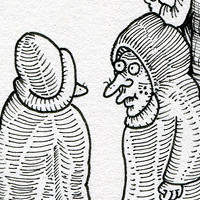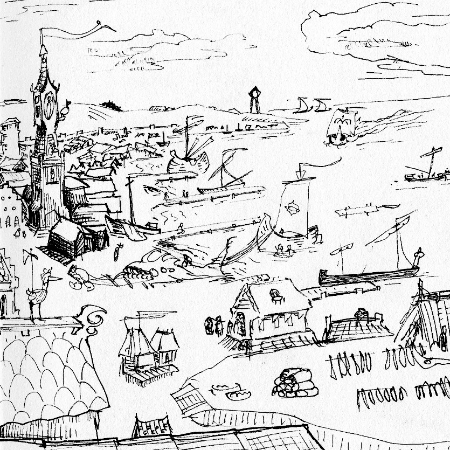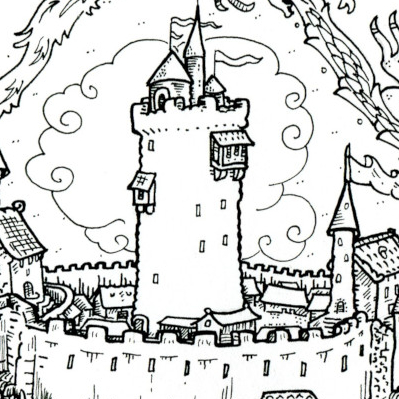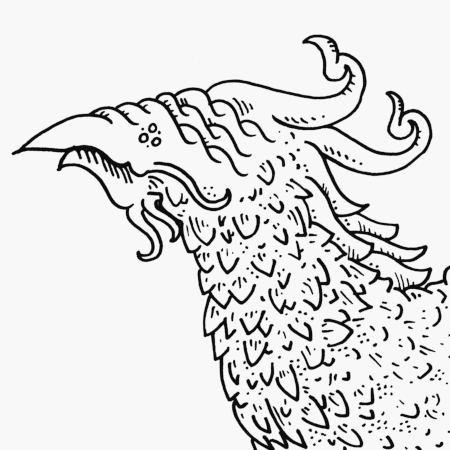
“Vis, volk, vrijheid!”
Life across the sea
THE TRADING POST VOLXTEEN, 30 years after its founding. Originally intended as a resupply station for fishing fleets, it grew to become a central hub connecting the many logging camps of the island continent Pýktteº. Construction of the walls started a few years after landfall to defend the settlers from local hostile clans. For several decades the continued existence of Volxteen relied on hard work and stalwart defense.
By year 30 the hostile natives were no longer a threat, and Volxteen would go on to become a flourishing port and main entrance to the untamed wilderness of Pýktte.
Timeline
THERE IS no shared calendar in Bos. Instead cities and locales calculate time starting from their founding year. This method is far from perfect, and miscalculations are commonplace due to the whimsical nature of Sun & Moon and counting errors. Cities who want to amplify their importance add a few years to their age every now and then. Surrounding villages may adopt the timeline of their parent city for ease of use or to piggyback on its status.
Some isolated communities that may be very ancient have not introduced this custom. To most people, time is of little importance, and counting it is a fool’s errand.
The Volxteen calendar abbreviation is Vx.
Prelude
THE DRITTEKOUº has struck Bos: three harsh winters in a row lay a heavy burden on the food industries: crops fail, orchards yield stunted fruit, and schools of fish are caught in the ice as the shallow coastlines freeze overnight. While the ruling class is tucked away in lavish palaces and castles, the commoners suffer. Trade companies watch the economy collapse, as prices skyrocket as resources dwindle.
Vx 0
IN AN ATTEMPT to open up new fishing areas a resupply station is built on the southern coast of Pýktte. Its purpose is to offer a safe haven for the fishing fleets that attempt to go fish in the open seas west of Bos. The location is on a rocky beach, next to the mouth of the river Geeuw. All are welcome: adventurers, commoners and fortune seekers alike, and the settlement is dubbed Volxteen, ‘People’s Rock’. The planning, organizing and construction of Volxteen are made possible by the largest use of credit thus far, an unprecedented financial gamble.
Vx 3
THE JUNIOR SETTLEMENT is soon attacked by raiders, denizens of Mersseº. Warehouses are plundered, docks are set ablaze, and many are left dead or wounded. Construction of a wooden palissade is begun, while rocks from the surrounding fields are gathered in order to build up stone fortifications. Too much is invested to give up so soon. To accompany a diet of fish & kelp, a particularly dry cheese is imported: Steenkeysº. It is a rock-hard poor man’s cheese that lasts ages. The cheese wheels are laid out on the cliffs, where they are pickled by the wind & the waves.
Vx 5
THE FISHING INDUSTRY is taking off and the walls are completed. A second large-scale raid by the Mersses is repealed. The assailants are chased down as they retreat. Pickled cheese is now a routine snack during business talks, and has become somewhat of a rare delicacy among the rich.
Vx 8
FORAYS ALONG the river Geeuw lead explorers into the heart of the Pýktte forests. This pristine wilderness is home to a surprising variety of fauna & flora.
Rare and coveted trees such as Blanckeboom and Plooytekke* are found in abundance. Cheese is now routinely imported, laid out on the beach for 3, 6 or 9 years, and exported again, to be sold as a luxurious treat. Dried fruit has taken its place in the local diet, along with a variety of nuts, truffles & berries from the lush woodlands. Occasional raids by natives are fended off with ease.
Vx 11
LOGGING CAMPS are established along the banks of the river Geeuw, and exploitation of the forests is begun.
Overall, this happens more organized and ecologically responsible than on the mainland. Soil erosion is well understood, and most lumberjacks take care to plant saplings as they chop down trees. Surprisingly these camps are left alone by the natives, perhaps the reason being that lumber is of no value to them.
Vx 21
A MASS ASSAULT by the remaining Mersse clans initially takes Volxteen by surprise.
Combatants are spread out over the settlement, even reaching the docks!
Complacency would have got the better of the settlers were it not for a patrol ship loaded with mercenaries arrives in the nick of time. They swiftly assert control over the battle and the attackers are routed and cut down to the last.
Vx 44
AS THE 44th Juupla Festival of Volxteen is celebrated, plans for a second settlement are unveiled: Klýnnesteen (‘Little Rock’), will be founded further inland along the same river Geeuw. It will connect a few dozen logging camps and send their lumber downstream towards Volxteen.
Along the coast many small, seasonal communities are sprouting like mushrooms. Adventurous families from the islands of Schedltlandº and Greater Zee sail across the ocean to build their Vischkot, live off the land & fish to their hearts content. In autumn they return to their homes with an abundance of smoke-dried fish and barrels full of nutritious nuts & truffles.
Notes
The caption reads: “Fish, (the) people, freedom!”
Pýktte— An island-continent that is home to a wild variety of species. It is a mostly untouched wilderness where both plant & animal can grow to prodigious size. The continent is not unknown to the mainlanders, there simply never seemed much need or interest to explore the inland.
Believed to be inhabited by a variety of strange & primordial beings, it does make for a good source of wild tales and incredible stories.
Drittekou — The Drittekou, or Dritfrýsse (Three-cold, Three-frost) is a seldom occuring 3-year period where summers are wet & cold, and every winter is more bitter than the one before. These are times of famine and great societal upheaval.
The Drittekou preceding the founding of Volxteen was particularly tough. By the spring of the fourth year nearly a fifth of the Bos population had starved or frozen to death, walled into the ice. A great deal of breeds had migrated to the inland, kickstarting a new period of intense laboring and agricultural renewal. Many traditional power structures had weakened & new trades had developed.
From Dutch: drie, derde (three, third) and koude (cold). ‘Frýsse’ is taken from from vriezen (to freeze).
Mersse — An earlier attempt to settle Pýktte, largely forgotten in the smudge of time, resulted in the creation of Mersse, a joyful Free State with a strong focus on communalism. It flourished independently and isolated of the Bos mainland.
The very same horror winters from the Drittekou left it devastated, the subsequent food crisis led to ever greater social friction until rival factions turned to infighting. Several small family groups stayed intact and ventured further north into the unknown. The remaining settlements reorganized themselves in clan structures who found a common victim in young Volxteen. But their prey spelled their doom: with the might of the clans broken, the Mersses have now adopted a hunter-gatherer lifestyle, roaming the woodlands and occasionaly revisiting the ruins of their utopian past.
Volxteen has attempted to welcome them back into its arms, but other than occasional bartering they show little interest in Bos society.
Plooytekke & Blanckeboom — 2 related types of tree with some remarkable properties.
The twigs of the Plooytekke tree can be coiled to a spring, as seen in the newly popular string-less handapults. The bark of the Blanckeboom is a popular crafting material for suits of plate armor. The wood itself, when properly treated, becomes flexible but nigh-unbreakable. It is possible to use the logs as ship masts or even build ‘living’ palissades, although the health of the wood invariably deteriorates.
From Dutch: ‘plooi, plooien’ (to bend) and ‘takken’ (branches). Blank (‘blank’, ‘white’, can also refer to a drawn weapon: blanke zwaarden, meaning ‘drawn swords’) and boom (tree).
Steenkeys — ‘Stone cheese’, also known as Ettekorst, ‘hard-crust’From Dutch steen (stone) and kaas (cheese).
Scheldtland — A region of estuaries, tidal basins, and hundreds of islands of varying size.
Greater Zee — a collective name for all the islands, lagoons and archipelagos between the ‘old’continent and the new. Depicted on this map.









